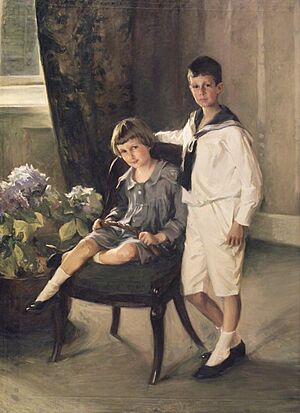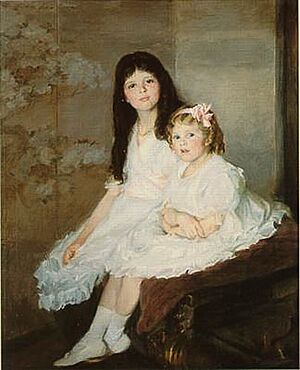Lydia Field Emmet facts for kids
Quick facts for kids
Lydia Field Emmet
|
|
|---|---|
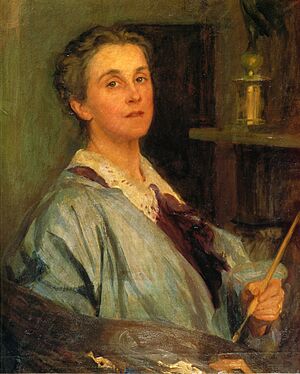
"Self Portrait". 1912. Oil on canvas
|
|
| Born | January 23, 1866 |
| Died | August 16, 1952 |
| Nationality | American |
| Known for | Painting, Portraiture |
Lydia Field Emmet (born January 23, 1866 – died August 16, 1952) was an American artist. She was most famous for painting portraits of people. Lydia studied with many well-known artists like William Merritt Chase and Tony Robert-Fleury. Her paintings were shown in many places. Today, you can see her art in the White House and famous museums like the Metropolitan Museum of Art.
Contents
Early Life and Family History
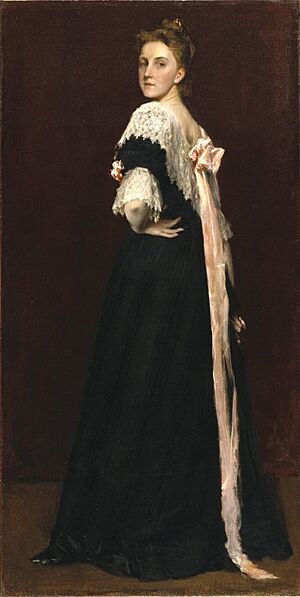
Lydia Emmet was born on January 23, 1866, in New Rochelle, New York. She was the seventh of eight children. Her father, William Jenkins Emmet, was a merchant. Her mother, Julia Colt Pierson, was an illustrator.
Lydia came from a very interesting family. Her great-grandfather, Thomas Addis Emmet, was a lawyer. He was involved in Irish politics. His younger brother, Robert Emmet, was executed in 1803 for trying to start an Irish rebellion. Thomas then moved to the United States with his family.
Lydia's grandfather, Judge Robert Emmet, was also a lawyer. He fought in the War of 1812. He also cared about Irish politics. He led a group in the U.S. that supported changes in Ireland.
Her other grandfather, Josiah G. Pierson, was an inventor. He created a company that made cut nails. He is thought to have invented the first working machine for cutting nails in 1795.
Lydia had two sisters, Rosina Emmet Sherwood and Jane Emmet de Glehn. They also became successful artists. Their cousin, Ellen Emmet Rand, was an artist too.
Many of Lydia's brothers were also very talented. William LeRoy Emmet was an engineer at General Electric. He helped develop steam turbines and electric ship power. Another brother, Robert Temple Emmet, received the Medal of Honor. Her brother Devereux Emmet designed over 150 golf courses. Her brother Christopher Temple Emmet was a lawyer and sportsman.
Learning to Be an Artist
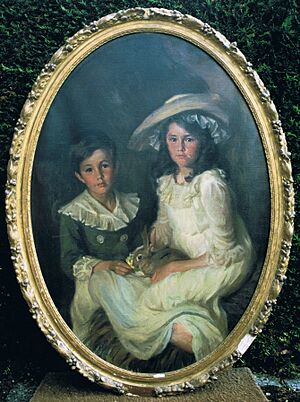
Lydia's older sister, Rosina, gave her first art lessons. Later, Lydia and Rosina went to the Académie Julian in Paris, France, from 1884 to 1885.
Their family had lost money after the American Civil War. The sisters could only study abroad because a cousin left them some money. They didn't love the Académie Julian. Rosina felt the art standards were too low. But they liked their teacher, Tony Robert-Fleury. Lydia found him "very inspiring."
After Paris, Lydia and her sisters returned to New York. They studied with the famous American painter William Merritt Chase. In New York City, Lydia also learned from artists like Harry Siddons Mowbray and Kenyon Cox. She continued her training in Paris with other artists. She mainly painted with watercolors and oil paints.
While studying in Europe, Lydia and her cousin Ellen joined a group of American artists. They stayed at Hotel Baudy near Claude Monet's home in Giverny, France.
Artistic Career and Achievements
Lydia's first big art job was in 1883. At just 16, she was asked to draw pictures for a children's book. The book was called Little Folk in Green.
In the early 1890s, Lydia also taught art classes. She helped her former teacher, William Merritt Chase. She taught at his summer art school on Long Island, New York.
In 1893, Lydia was chosen for a special project. She joined other important women artists like Mary Cassatt. They painted large pictures called murals for the new Woman's Building. This building was part of the World's Columbian Exposition in Chicago. Lydia painted a picture called Art, Literature and Imagination.

Lydia also designed beautiful stained glass windows for Louis Comfort Tiffany. She drew many pictures for Harper's Bazaar magazine. President Herbert Hoover even asked her to paint a portrait of the First Lady, Lou Henry Hoover. This painting is now in the White House.
In 1896, Lydia designed the Cullum Geographical Medal. This is an old award from the American Geographical Society. It honors people who make important discoveries in geography.
Lydia was known for her portraits of children. But she actually preferred painting adults. She felt that painting children was not as challenging. One of her most famous child portraits is of her nephew, Robert Emmet Sherwood, who became a playwright.
Lydia often showed her art at the National Academy of Design. She won many awards for her work. These included prizes at the World's Columbian Exposition (1893) and the Pan-American Exhibition (1901). She also won the Thomas R. Proctor Prize (1907). In 1909, she became an associate of the National Academy of Design. By 1911, she was a full Academician.
Legacy and Recognition
In 2007, a special art show was held in Manhattan. It featured paintings by five generations of women from the Emmet family. There were 130 artworks by 14 artists. It showed how art talent ran through their family.
Memberships
- American Federation of Arts
- American Society of Miniature Painters (ASMP)
- Art Students League of New York
- Connecticut Academy of Fine Arts
- National Academy of Design
- National Association of Portrait Painters
- National Association of Women Artist
- New York Watercolor Club
- Stockbridge Art Association
Where to See Her Art
- Berkshire Museum, Pittsfield, Massachusetts
- Brooklyn Museum, New York City
- Castle Hill on the Crane Estate, Ipswich, Massachusetts
- Delaware Art Museum, Wilmington, Delaware
- Groton School, Groton, Massachusetts
- Lyme Academy of Fine Arts, Lyme Academy Gallery, Old Lyme, Connecticut
- Metropolitan Museum of Art, New York City
- Museum of the City of New York
- National Academy of Design, New York City, New York
- National Gallery of Art, Washington, D.C.
- National Museum of Women in the Arts, Washington, D.C.
- National Society of Colonial Dames of America, State of Vermont
- New York Historical Society
- Newport Art Museum, Newport, Rhode Island
- Old Westbury Gardens, Old Westbury, New York
- Parrish Art Museum, Southampton, New York
- RISD Museum, Providence, Rhode Island
- United States Military Academy Museum, West Point, New York
- White House, Washington, D.C.
 | Kyle Baker |
 | Joseph Yoakum |
 | Laura Wheeler Waring |
 | Henry Ossawa Tanner |


